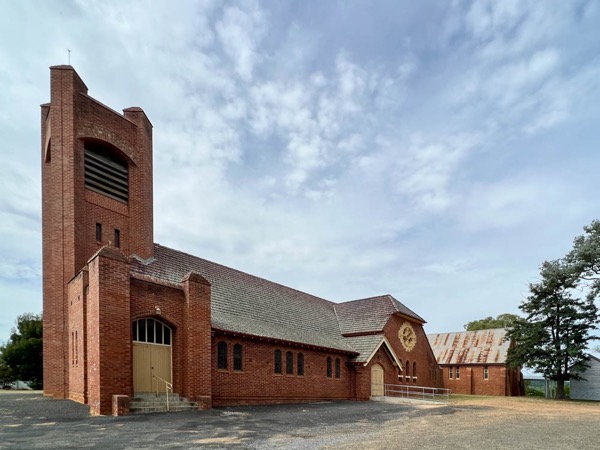
Our trip around the locations at which Jill’s Grandfather served during his police career is not in the same order as the places to which we was posted. We are now at Cowra and today, we spent a few hours exploring the nearby little village of Gooloogong, which is where his story starts.
Frederick GeorgeRuffles, joined the NSW Mounted Police Force on October 21st 1901 when the was 23 years old. His first posting was to Gooloogong some years after as a Mounted Constable. He served at Gooloogong for nine years before being posted to Cooma as a Sergeant.
He and Jill’s grandmother, Emeline Jane Dawes, were married in the All Saints Anglican Church in the nearby town of Canowindra (pronounced ‘’Can-ound-ra’) in May 20, 1908.

Jill’s mother, Nancy Ellen Mary, was born in the police station at Goolagong on April 11, 1911. Her brother Loftus Robert Henry, was one year old when Nancy arrived and a sister, Elvy Jean was born later in 1913.
In her journal, Jill’s mother wrote:
I was born in the police station at Goolagong, New South Wales; a little country town with a population of about 300 people. My dad was the local mounted policeman, Constable Frederick George Ruffels. He had a lovely horse called ‘Dictator’. HIs district took in several small towns – Grenfell, Eugowra, and Canowindra where he would take his horse to local shows and even races once a year.
We had a good life with plenty of home help from the local Blacks who had a camp on the Lachlan River about half of mile, or less, from our home. They would help with chopping wood, sweeping yards, gardening and washing. Every month they were handed out rations flour and tobacco. The blacks loved the booze. They would get drunk when dad was out of town. The men used to come to the police station and ask Mum “is the big boss away” and then they played up. The young black girls would come and hide in our bathroom, really frightened of their men folk. It was was hard on my mum too. Dad was away a lot and she had three young children.
Dad grew most of our own vegetables in season. We only had tank water and depended on the rain for water. We had our own fouls and eggs. Dad was a good shot and we had many a rabbit and he caught many a lovely codfish in the Lachlan River
It was cold in winter and very hot in summer. We had a big open fires in winter and a wood stove for cooking. To keep food cool, we had a Coolgardie safe. There were no cars, no telephones, no electricity, no radio or TV. Mail would come about once a week.
We had a piano and music gave us great fun. Mum loved the piano and Dad loved to sing. Mum played by ear; she was good. We had a lovely family life.
Dad’s office was attached to the house – a good brick house with two bedrooms, a lounge and a kitchen across the big back veranda where the jail and lock up were. He had to cross the veranda to put the ‘naughty men’ away through big iron doors which contained two cells. There was a small exercise yard, toilet and washroom. When their were no prisoners, we sheltered in the cool cells during the heat of summer and the dust storms.
We seemed to enjoy life – everyone knew each other. The local churches all had their fetes. In 1914 the war began and soldiers wee on the march. Women were knitting and doing up parcels to send to the troops. That is how it was!
I started school at the local convent school at five years old. One had to be six years old to start at the public school which had one teacher, Mrs Farrington, and about 15 children including six black kids. I started to learn the piano at seven years of age and loved it.
The local bank manager, Mr McWilliam, used to take me down to the Lauchlan River for swimming and fishing. It was fun and the beginning of my very interesting life.
Dad was nine years at Gooloogong after which he was promoted to Cooma as a Sergeant. I was eight years old and onto Cooma we went in the Monaro District. It was very cold, but a new beginning.






A telling recollection. My great uncle ( Leila’s farther) was a mounted Police Sergeant in Dorrigo northern NSW and much of his story and that of his family resembles much of your grandfather and mother. How much our daily living has changed in such a short lapse of time. How old was your Mother Jill when she made these journal entries? A moving time for you Jill, exploring the places of some of your family’s history.8